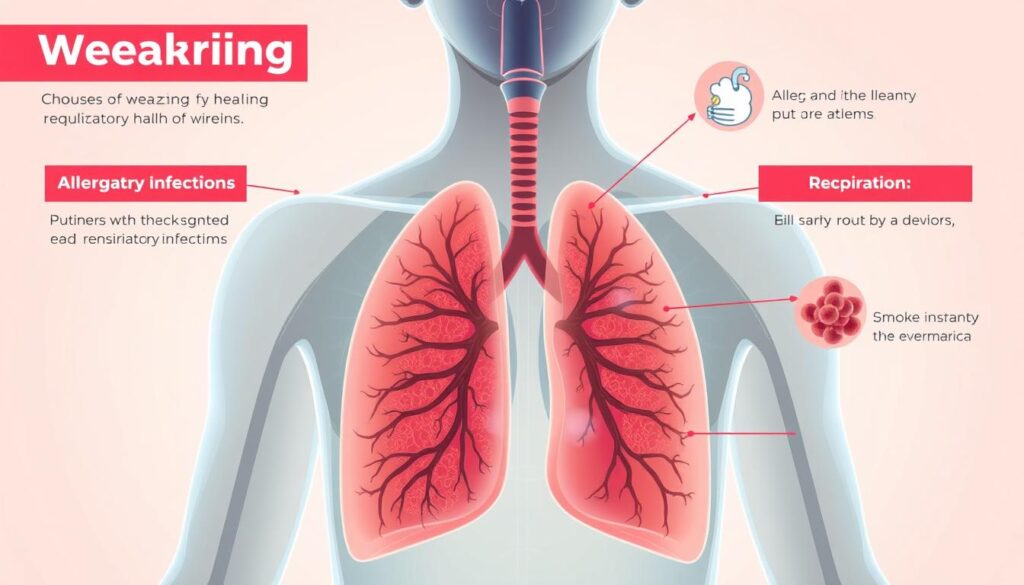Wheezing is a high-pitched whistle that signals potential breathing problems. It happens when airways narrow, making it hard to breathe. Knowing what causes wheezing is key for proper care12.
Various conditions can trigger wheezing and affect your lung health. Asthma and chronic respiratory issues often lead to this distinct sound. Repeated wheezing may stem from asthma, COPD, or respiratory infections13.
Wheezing affects different age groups uniquely. Young adults often face asthma-related wheezing. Older adults might struggle more with COPD-related breathing issues3.
Smoking, allergies, and environmental factors can worsen respiratory problems. These triggers can lead to more frequent wheezing episodes12.
Puntos clave
- Wheezing is a high-pitched sound indicating narrowed airways
- Asthma and COPD are primary causes of repeated wheezing
- Respiratory issues can affect both children and adults
- Smoking and allergies can trigger wheezing episodes
- Different age groups experience wheezing differently
What is Wheezing and How It Affects Your Breathing
Wheezing is a high-pitched whistle when you breathe. It happens when air struggles through narrow airways. This sound can warn of respiratory issues4.
Understanding the Whistling Sound
Wheezing is most noticeable when you breathe out. It shows restricted airflow in your breathing tubes. Various medical conditions can cause this problem5.
- Asma
- Bronchitis
- Allergic Reactions
- Respiratory infections
Signs and Symptoms to Watch For
Spotting wheezing early helps address Airway Blockage quickly. Look out for these key signs:
- Dificultad para respirar
- Chest tightness
- Tos persistente
- Bluish skin discoloration
“Wheezing can be a critical signal that your respiratory system needs attention.”
Impacto en la vida diaria
Ongoing wheezing can disrupt your daily routine. It may cause sleep problems and limit physical activity. This can lower your overall quality of life6.
Young children, especially babies under two, often wheeze from viral infections4. If wheezing persists or gets severe, see a doctor right away5.
Common Wheezing Causes and Risk Factors
Knowing why wheezing happens can improve your breathing health. Over half of people face wheezing symptoms. Various conditions can cause this breathing issue7.
Kids often wheeze due to specific risk factors. Structural abnormalities are key, affecting 36% of children with ongoing wheezing7. These include enlarged tonsils or adenoids.
Respiratory infections can lead to long-term breathing problems. They increase the chances of persistent wheezing in children.
- Chronic Obstructive Pulmonary Disease (COPD)
- Asma
- Allergic reactions
- Respiratory infections
Smoking severely harms breathing health. It’s a major trigger for wheezing in smokers and those around them8.
Environmental factors like air pollution and workplace chemicals raise the risk of breathing issues8. Allergens can also cause respiratory problems.
Genes play a big role in breathing health. A parent’s asthma history increases a child’s risk 3-6 times8.
Key risk factors for wheezing include:
- Obesidad
- Exposure to industrial dust
- Chemical fume interactions
- Chronic acid reflux like GERD
See a doctor if you wheeze often. Early detection and management can greatly improve your breathing health9.
Proper care helps prevent possible complications. Don’t ignore persistent wheezing symptoms.
Conclusión
Chest congestion and respiratory issues are signals from your body that need attention. Understanding these can help you take control of your health. Your approach to managing breathing challenges can significantly impact your well-being10.
Respiratory conditions can affect anyone, from infants to adults. In fact, 20-25% of infants experience wheezing in their first year10. Medical experts suggest a proactive strategy for addressing wheezing.
Identifying the root cause is crucial. It could stem from respiratory complications like asthma or bronchitis10. Avoiding tobacco smoke and maintaining clean air is essential to prevent worsening respiratory issues10.
Treatment varies based on age and condition. For children, it may include warm fluids and humidifiers11. Adults might need medications, breathing exercises, and lifestyle changes.
Regular check-ups with healthcare providers are vital for monitoring and managing respiratory health10. Early detection and proper management can prevent serious complications. Your commitment to addressing wheezing can improve your breathing and quality of life.
Always consult a healthcare professional for a personalized approach to your specific respiratory needs. With the right care, you can breathe easier and live more comfortably.
Preguntas frecuentes
What exactly is wheezing?
What are the most common causes of wheezing?
Is wheezing more common in children or adults?
When should I be concerned about wheezing?
How can I prevent wheezing?
What treatment options are available for wheezing?
Can smoking cause wheezing?
Are allergies linked to wheezing?
Enlaces de origen
- Wheezing Causes – https://www.mayoclinic.org/symptoms/wheezing/basics/causes/sym-20050764
- Wheezing – https://www.webmd.com/asthma/understanding-wheezing-basics
- When Should I Worry About Wheezing? – https://www.houstonmethodist.org/blog/articles/2022/mar/when-should-i-worry-about-wheezing/
- Wheezing: MedlinePlus Medical Encyclopedia – https://medlineplus.gov/ency/article/003070.htm
- Wheezing Information | Mount Sinai – https://www.mountsinai.org/health-library/symptoms/wheezing
- Wheezing – UF Health – https://ufhealth.org/conditions-and-treatments/wheezing
- What Causes Your Wheezing? – https://www.verywellhealth.com/what-causes-wheezing-201235
- What Causes Asthma? – https://www.lung.org/lung-health-diseases/lung-disease-lookup/asthma/learn-about-asthma/what-causes-asthma
- Wheezing: Causes, Treatments, and Home Remedies – https://www.healthline.com/health/wheezing
- Know About The Underlying Causes For Wheezing – https://www.netmeds.com/health-library/post/know-about-the-underlying-causes-for-wheezing?srsltid=AfmBOor_wKhU7Qkdr3xVC_2xKZimSH-Td_C25cMBMYPHtp6X4FLZPuke
- Wheezing (Other Than Asthma) – https://www.seattlechildrens.org/conditions/a-z/wheezing-other-than-asthma/
